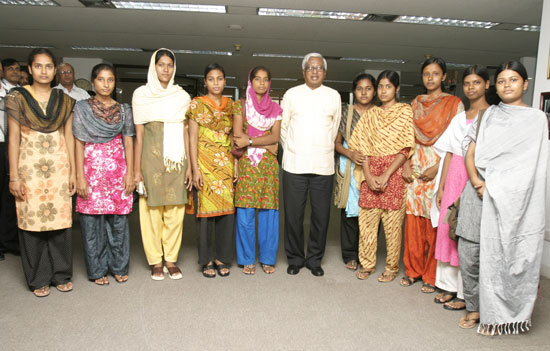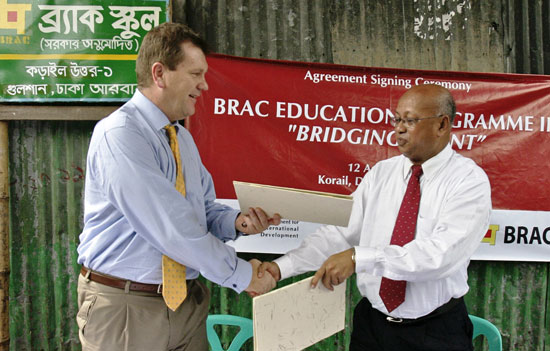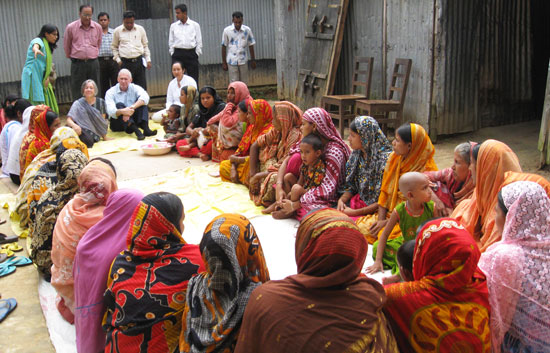
News (828)
BRAC-Rai Foundation Scholarship recipients met Fazle Hasan Abed
15 September 2009, Dhaka. Under BRAC Education Programme’s (BEP) Medhabikash Programme 10 girl students have been awarded BRAC-Rai Foundation Scholarship-2009 (2nd Batch). Before departing for India, recipient students met BRAC Chairperson Fazle Hasan Abed on September 09, 2009 at his office.
Under the scholarship programme they have gone to Rai Foundation, Delhi to pursue their under graduation courses. Out of 10 girls, 4 will study Bachelor of Technology (B.Tech) in EIILM University, Sikkim and 6 will study BBA in Behror campus, Rajasthan of Rai University. 1st Batch’s 10 girls of Medhabikash programme have already been studying B. Tech (IT & Communication) in EIILM University, Sikkim.

BRAC-Rai Foundation Scholarship-2009 recipient students met BRAC Chairperson Fazle Hasan Abed at his office
Mr. Abed urged the students to come back to Bangladesh completing their study abroad and serve the nation with dexterous ability.He advised the students to work in a way so that thousands of the poor students can be benefited out of their services. “Keeping the poor people aside, Bangladesh cannot expect prosperity” he said to the students.
Among others Executive Director, BRAC Dr. Mahabub Hossain, Director,Dr. Safiqul Islam, Programme Head Md. Shahidul Hasan were present during the meeting.
Scholarship covers expenditure like tuition, boarding, lodging, medical by Rai University and all kinds of transport inside Bangladesh and up to Delhi; visa processing and passport cost by BRAC Education Programme.
Rai Foundation, India was established by renowned industrialist and philanthropic Mr. Venai Rai. It has chain colleges/universities all over India. Rai institute rankings 10 among the top institutes in India. For promoting talents Mr. Venai Rai launches GIRL GENIUS, GIFTED GIRL SCHOLARSHIP. At the outset, it offers the scholarship only to India’s disadvantaged students. Later on the support was extended to other countries including Bangladesh, Mauritaus, Bhutan, Nepal, Brazil, African countries. Rai Foundation offers 10 - 20 scholarships to Bangladesh underprivileged girl students through BEP’s Medhabikash programme each year.
Ten girls get BRAC-Rai Foundation Scholarships
10 September 2009, Dhaka. Ten female students were awarded BRAC-Rai Foundation Scholarships 2009 (2nd batch) for higher education under BRAC’s Medhabikash programme.
BRAC Chairperson Fazle Hasan Abed urged the students to return home to serve the nation after completing their studies abroad. He also advised them to work hard so that their services can benefit thousands of other poor students.
“Keeping the poor people aside, Bangladesh cannot expect prosperity,” he told the students when they called on him before leaving for India on Sept. 9.
Ten girls get BRAC-Rai Foundation Scholarships
10 September 2009, Dhaka. Ten female students were awarded BRAC-Rai Foundation Scholarships 2009 (2nd batch) for higher education under BRAC’s Medhabikash programme.
BRAC Chairperson Fazle Hasan Abed urged the students to return home to serve the nation after completing their studies abroad. He also advised them to work hard so that their services can benefit thousands of other poor students.
“Keeping the poor people aside, Bangladesh cannot expect prosperity,” he told the students when they called on him before leaving for India on Sept. 9.
BRAC and International Potato Center signs MoU for potato research and development
03 September 2009, Dhaka. BRAC and the International Potato Center (CIP) signed a Memorandum of Understanding (MoU) for sweet potato and potato collaborative research and development on 3rd September in BRAC Centre, Dhaka.
CIP is a non-profit scientific organisation established under the Consultative Group of International Agriculture Research (CGIAR) headquartered in Lima, Peru. The center works to bring about sustainable increases in production and utilisation of potato, sweet potato and other roots and tubers in the developing countries and management of agricultural resources in the Andes and other mountain areas.

BRAC carries out agricultural extension, research and support services for poor farming households in Bangladesh including those pursuing sweet potato and potato livelihoods. Both BRAC and CIP consider sweet potato and potato as key livelihood commodities with high potential impact on poverty reduction, food security and nutrition improvement in Bangladesh. The MoU will remain in effect for a period of three years.
BRAC and International Potato Center signs MoU for potato research and development
03 September 2009, Dhaka. BRAC and the International Potato Center (CIP) signed a Memorandum of Understanding (MoU) for sweet potato and potato collaborative research and development on 3rd September in BRAC Centre, Dhaka.
CIP is a non-profit scientific organisation established under the Consultative Group of International Agriculture Research (CGIAR) headquartered in Lima, Peru. The center works to bring about sustainable increases in production and utilisation of potato, sweet potato and other roots and tubers in the developing countries and management of agricultural resources in the Andes and other mountain areas.

BRAC carries out agricultural extension, research and support services for poor farming households in Bangladesh including those pursuing sweet potato and potato livelihoods. Both BRAC and CIP consider sweet potato and potato as key livelihood commodities with high potential impact on poverty reduction, food security and nutrition improvement in Bangladesh. The MoU will remain in effect for a period of three years.
BRAC Technical Assistance team taste success in Sudan
27 August 2009, Dhaka. BRAC for the first time has entered the fast growing Islamic Finance Industry. BRAC is providing Technical Assistance (TA) to Bank Al Usra in Khartoum, Sudan. This is being carried out under the one year agreement of USD 334,880 signed between the Islamic Development Bank (IDB) Jeddah, Central Bank of Sudan (CBOS) and BRAC Bangladesh.
With BRAC’s assistance, Bank Al Usra’s performance has been praised in the banking sector of Sudan for its outreach in both rural and urban areas, and meeting the needs of the communities. BRAC has successfully completed the first three months of its Technical Assistance to Bank Al Usra. A three member BRAC Microfinance specialist team led by Murtaza Reza Chowdhury arrived in Khartoum on April to assist in building the capacity of Bank Al Usra, the first Islamic Microfinance Bank in Sudan. Based on the team’s performance during the first three months, IDB has already paid the second installment to BRAC.
Bank Al Usra has eleven branch offices (six of which had been opened with the assistance of BRAC TA team) in four states. Eight more branches are to be opened by the end of the Agreement in March 2010.
DFID and BRAC sign £18.5 million agreement to aid Bangladesh’s Education for All campaign
23 August 2009, Dhaka. BRAC is pleased to announce that an agreement was signed on August 21st with the UK Department for International Development (DFID) under which DFID will provide a grant of £18.5 million (BDT 2,049 million) to support the operation of BRAC’s Education Programme for the financial year 2009-2010.
The Programme is funded by a consortium of donors including the Government of the United Kingdom.
The agreement was signed by Mr. Chris Austin, Country Representative of DFID Bangladesh, and Dr. Mahabub Hossain, Executive Director of BRAC, at a simple ceremony in front of the Uttar Korail BRAC primary school in Gulshan’s Korail slum.

DFID Country Representative Chris Austin and BRAC Executive Director Dr. Mahabub Hossain sign the agreement in a BRAC Primary school yard at Korail Slum, Gulshan
Under the terms of the grant, funds will primarily be used to support the running of 30,000 pre-primary and 33,000 primary BRAC schools across the country. Part of the funds will be allocated for building capacity of teachers working in secondary schools as well as for livelihood and skills development training for adolescent and youth under BRAC’s adolescent development and continuing education programmes.
While signing the agreement, Mr. Chris Austin reaffirmed UK government’s commitment to ensure every child's right to education. He said, “This is a grant for BRAC that’s going to help a million boys and girl come to a school like this, who otherwise won’t have a chance to go to school. The other important thing to remember is the boys and girls will stay in school; the quality of their learning will be really good. The opportunities they will have as individuals will be good and the idea is they will graduate in to the state system. We are giving all the children the best possible chance”.
Dr. Hossain said “ This generous support provided by DFID will help BRAC continue its education programme at the same level during the current world financial crisis and continue to provide basic education to one million children left out of the formal education system and to enhance the quality of 2000 poorly performing secondary schools.”.
US ambassador appreciates BRAC’s contribution to Bangladesh’s development
21 August 2009, Dhaka. -- “BRAC is making an impressive contribution to the development of Bangladesh. I was very impressed with the BRAC programs I observed in Gazipur district.”, reported the U.S. Ambassador to Bangladesh, James F. Moriarty, following a recent BRAC visit. The Ambassador, along with Mrs. Lauren Moriarty, Mr. Carey Gordon, Deputy Mission Director, USAID, and other Embassy staff, visited BRAC programmes in Gazipur district on August 18 to strengthen their knowledge and understanding of BRAC.

US Ambassador Observing Activities of a BRAC Village Organisation Meeting at Dhanua village of Sreepur upazila
Ambassador Moriarty’s visit began with the observation of a microfinance group meeting in Dhanua village of Sreepur upazila. He had lively exchanges with the group members about loan sizes, use of the loans by the women, means of repayment and their economic condition after becoming a BRAC borrower.
The US Embassy team observed several activities of the BRAC Health Programme. They learnt about the GoB-BRAC partnership programme for controlling tuberculosis (TB), including the first hand role played by BRAC Shasthya Shebikas (health volunteers) who administer the Directly Observed Therapy Shortcourse (DOTS) to TB patients. They met with several members of the community who are undergoing treatment and then visited a GoB Community Clinic where the TB smears are processed in a mobile laboratory. Ambassador Moriarty also spent some time talking with a pregnant woman as well as a young mother and her newborn, who are receiving support from BRAC’s Maternal, Neonatal and Child Health programme.
Later, the Ambassador and the team observed a human rights and legal education class for women in Faridpur village and engaged in discussions with the BRAC para-legal volunteer and members of the class. In reply to Ambassador Moriarty’s query about the most common legal problems faced by the community, the women cited land issues.
During his visit the Ambassador also met with the staff of BRAC’s Sreepur Area Office and the Gazipur Civil Surgeon.
US ambassador appreciates BRAC’s contribution to Bangladesh’s development
21 August 2009, Dhaka. -- “BRAC is making an impressive contribution to the development of Bangladesh. I was very impressed with the BRAC programs I observed in Gazipur district.”, reported the U.S. Ambassador to Bangladesh, James F. Moriarty, following a recent BRAC visit. The Ambassador, along with Mrs. Lauren Moriarty, Mr. Carey Gordon, Deputy Mission Director, USAID, and other Embassy staff, visited BRAC programmes in Gazipur district on August 18 to strengthen their knowledge and understanding of BRAC.

US Ambassador Observing Activities of a BRAC Village Organisation Meeting at Dhanua village of Sreepur upazila
Ambassador Moriarty’s visit began with the observation of a microfinance group meeting in Dhanua village of Sreepur upazila. He had lively exchanges with the group members about loan sizes, use of the loans by the women, means of repayment and their economic condition after becoming a BRAC borrower.
The US Embassy team observed several activities of the BRAC Health Programme. They learnt about the GoB-BRAC partnership programme for controlling tuberculosis (TB), including the first hand role played by BRAC Shasthya Shebikas (health volunteers) who administer the Directly Observed Therapy Shortcourse (DOTS) to TB patients. They met with several members of the community who are undergoing treatment and then visited a GoB Community Clinic where the TB smears are processed in a mobile laboratory. Ambassador Moriarty also spent some time talking with a pregnant woman as well as a young mother and her newborn, who are receiving support from BRAC’s Maternal, Neonatal and Child Health programme.
Later, the Ambassador and the team observed a human rights and legal education class for women in Faridpur village and engaged in discussions with the BRAC para-legal volunteer and members of the class. In reply to Ambassador Moriarty’s query about the most common legal problems faced by the community, the women cited land issues.
During his visit the Ambassador also met with the staff of BRAC’s Sreepur Area Office and the Gazipur Civil Surgeon.
BRAC leads anti-poverty effort in post-conflict countries
29 July 2009, Dhaka. BRAC is leading a $15 million initiative to rebuild war-torn communities in West Africa, four organizations supporting the effort announced in New York, US recently.
The Soros Economic Development Fund, Open Society Initiative for West Africa, Omidyar Network, and Humanity United are funding this groundbreaking initiative to support families and prevent renewed conflict.
“This investment in the people of West Africa comes at a critical time,” said Stewart Paperin, president of the Soros Economic Development Fund. “With their countries emerging from devastating civil wars, this support gives people the tools to rebuild.”
BRAC, one of the world’s largest anti-poverty groups, is providing microfinance, health, and agricultural support in Sierra Leone and Liberia. It anticipates that over 500,000 people will benefit from these programs.
“In the face of overwhelming need, BRAC’s work has real potential to create opportunities for hundreds of thousands of families to stabilize their lives and build for the future,” said Matt Bannick, managing partner of Omidyar Network. “Our investment will help catalyze this economic and social impact.”
Since March, BRAC has opened 20 new microfinance branches in Sierra Leone and Liberia and will add 20 more by the end of the year. BRAC made its first loans in June. Over the next two years, it will provide financial services to tens of thousands of women, as well as agricultural supplies and training to small crop and livestock farmers. BRAC will also prepare four hundred community based health volunteers to provide ongoing essential healthcare and help fight deadly diseases like malaria, tuberculosis, and cholera.
“People desperately need to earn a living,” said Fazle Hasan Abed, founder and chairperson of BRAC. “Despite the many challenges these countries face, Liberia and Sierra Leone are uniquely positioned to become models for successful development in West Africa. We are committed to providing training and resources so that the poor, especially women, can unleash their capabilities as entrepreneurs and improve their livelihoods.”
BRAC’s work in Sierra Leone and Liberia is being funded through a combination of grants and equity, and BRAC is negotiating additional debt capital to finance the loan portfolio. This two-year pilot program will help BRAC build a long-term sustainable strategy for integrated development in Sierra Leone and Liberia.
Join the world’s biggest family




